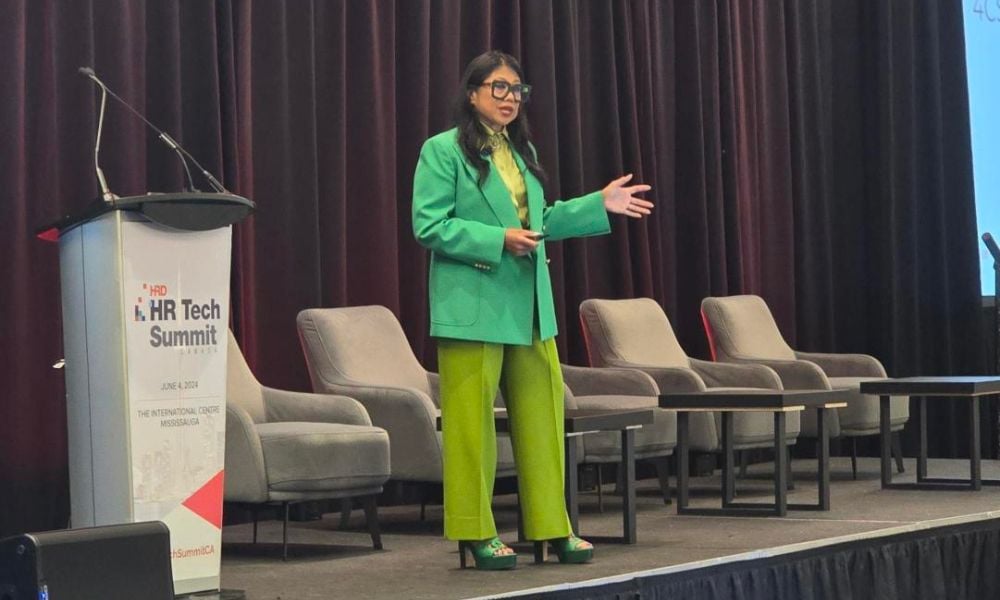
HRD's Tech Summit features panels, discussions and tech talks

Within the HR tech space, experts are seeing a rapid emergence of a broad collection of solutions that do “really specific things.” However, AI is only as good as the data it receives, resulting in a proliferation of solutions that make “big, bold promises that are hard to keep,” said Dominica Sortisio, principal research science product strategy at UKG.
Sortisio spoke at HRD’s Tech Summit in Toronto on June 4 during a fireside chat that highlighted the capabilities of AI and how to integrate it into the workplace.
“The question isn’t whether AI can help create great workplace experiences,” said Sortisio, “it’s already doing that, and there are many proven use cases that empower employees, unburden managers, and enhance the experience of the entire frontline workforce. Now, generative AI is going to supercharge everything.”
When making recommendations for employers integrating AI into the workplace, Sortisio highlights the need to ID opportunities for AI to make a difference. This goes hand in hand with the need to involve employees in the integration process to help them understand that AI is going to help them with their jobs, not replace them.
“Everyone wants to talk about big, blue sky AI projects like they’re going to fix everything about work or eliminate really complex challenges (like bias) overnight. It’s good that as a society we’re thinking like that and talking about it, because there are real big problems that need attention. It just won’t be a quick fix,” she said.
“But the good news is there are very real challenges where AI and gen AI can make an impact today. Why thumb through a handbook and interpret a policy when gen AI will allow for an employee to use conversational search to ask a question and then get an answer specific to their role and tenure? That’s a very simple, but very powerful, example of how we can use this technology to democratize access to information at work.”
HR tech allows employers to positively consolidate tasks, with HR moving beyond having to manage multiple different systems and duplicate tasks or data in different spots, said Gren Austin, head of Wealthsimple Work at Wealthsimple.
During the summit, Austin highlighted the advocation for more choice and flexibility for employees, meeting employees where they’re at with regards to technology and giving more power and customization to employees.
“I think a lot of the new HR tech is getting really good at connecting, talking and being built in a modern way that fits those pieces regarding consolidation and flexibility together,” Austin said. “But with that, the second piece is building complexity into the systems. And so, I think the expectation is, you offer that choice and flexibility to employees, and meet them where they're at, but that the back-end systems can continue to get better, so there isn't just more work for the administrators and the sponsors of these programs.”
During the panel ‘HR Analytics – Using data to deliver actionable intelligence,’ Christine Schmidt, people analytics lead at Rippling, highlighted the importance of data governance and privacy when integrating HR tech systems into the workplace.
However, she also pointed out that excessive security measures often hinder access to essential information. Balancing data sensitivity and accessibility is a significant challenge that requires considerable effort from HR teams, who are already burdened with manual tasks.
“People data is notoriously something that we want to keep very, very secure. And so, when we lock that data down, we throw the baby out with the bathwater. We locked down people's very sensitive information, like their home address, but at the same time, we also lock down their start date or their reporting structure,” she said.
“Trying to disentangle those two things to keep employee data sensitive and to provide data at the right time, requires a lot of time and effort that HR teams don't usually have because they're spending all this time doing manual work and being reactive to the business.”
So, Schmidt emphasizes the need for employers to “proceed with caution,” and ensure they are prioritising their order of operations correctly.
“Can you reliably tell me what your headcount is today? If you can't do that, then maybe table your AI implementation until you have your basics in order first," she said.